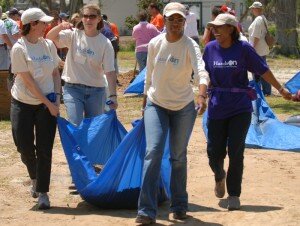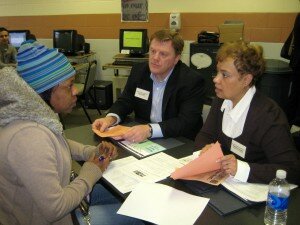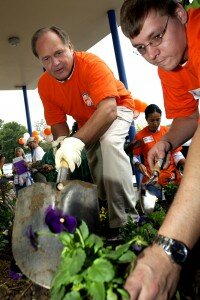 Today’s guest post comes from Michael LaRue, a Teen Volunteer Leader with HandsOn Suburban Chicago.
Today’s guest post comes from Michael LaRue, a Teen Volunteer Leader with HandsOn Suburban Chicago.
1) Let us know our boundaries: When you put teens in charge of something make sure you let them know their boundaries in the leadership. There have been many volunteer activities that I have participated in where I had no idea what I was suppose to do when it came to leadership. Whether it be overstepping my boundaries and giving instructions that the teen should not be giving. Or just standing there not knowing where to start because there have been people doing the jobs you thought were directed towards you.
2) Impact is most important to us! When thanking a Teen Volunteer know that most of us know we are doing a good job. If we weren’t happy with the progress or success of a program we wouldn’t be doing it. Therefore, if you’re going to thank us know that the only thanks we truly need is seeing the smile on the leader’s face or the smile of the people we’re serving (in my case the students I mentor).
3) Treat us with respect. Know that we are here to volunteer because we have passion for what we are volunteering for, As a teen leader I know that I don’t have full control and I would never expect that, what I do expect though is to be treated with respect for I am giving up time to help something that is important to me.
4) Don’t treat us like we are kids. We may not be adults, but we do have an idea of what is going on. Tell us what we need to do and allow us to ask for change in order to improve what needs to be done.
5) Don’t expect more out of teen volunteers than you expect out of yourself. We are a team; therefore we should be working together for a common goal, not separately.
Michael LaRue has been volunteering since he was a freshman in high school in his hometown of Arlington Heights, Illinois. In four short years, he’s worked with Riley Elementary School Homework Club tutoring students and helping them with homework. Through Buffalo Grove High School’s Interact Club, he’s helped to lead his peers in impacting their community in various ways. Most recently, he’s become a Teen Volunteer Leader with HandsOn Suburban Chicago, taking a key leadership role in the CHiL program, where he leads and supports 20 volunteers who work with middle school students to improve their grades through homework help as well by acting as role-models and mentors.
HandsOn Suburban Chicago is a partner and grantee of generationOn, Points of Light’s global youth service enterprise. Through a dynamic partnership called Ready-Set-Go!, generationOn and HandsOn Suburban Chicago have almost doubled the amount of direct service and leadership opportunities available to youth in northwest suburban Chicago. To learn more about Ready-Set-Go! and to access our free resources to train adults to be more effective managers of youth volunteers, click here.








 Zachary Hecht is a senior at Commack High School where he is a High Honor Role student and an IB Diploma candidate. Zach is on the regional board of BBYO’s Nassau-Suffolk Region. His interests include international relations and economics.
Zachary Hecht is a senior at Commack High School where he is a High Honor Role student and an IB Diploma candidate. Zach is on the regional board of BBYO’s Nassau-Suffolk Region. His interests include international relations and economics.
 Volunteering and helping our fellow man has long been seen as an altruistic thing to do. But more selfish motives–pleasing friends, doing what you want–are more successful causes of effective volunteering! Regardless of motive, volunteering improves the health, happiness, and in some cases, the longevity of volunteers. Children who volunteer are more likely to grow up to be adults who volunteer. Even unwilling children who are forced to volunteer fare better than kids who don’t volunteer. Communities with lots of volunteers are more stable and better places to live, which in turn further boosts volunteerism.
Volunteering and helping our fellow man has long been seen as an altruistic thing to do. But more selfish motives–pleasing friends, doing what you want–are more successful causes of effective volunteering! Regardless of motive, volunteering improves the health, happiness, and in some cases, the longevity of volunteers. Children who volunteer are more likely to grow up to be adults who volunteer. Even unwilling children who are forced to volunteer fare better than kids who don’t volunteer. Communities with lots of volunteers are more stable and better places to live, which in turn further boosts volunteerism.
 When you’re looking for a job, your resume is going to be how an employer first gets to know you. Of course you want to include the work experience and education that makes you qualified for a job, but should you include your experience volunteering?
When you’re looking for a job, your resume is going to be how an employer first gets to know you. Of course you want to include the work experience and education that makes you qualified for a job, but should you include your experience volunteering?
